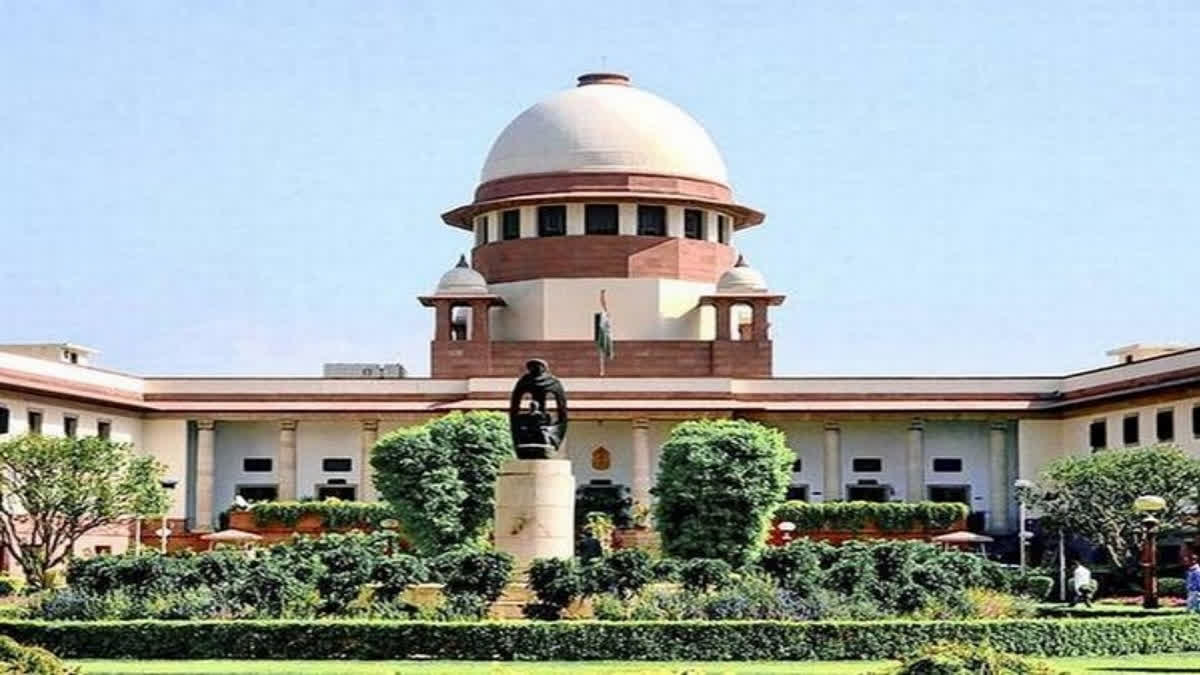New Delhi: Solicitor General Tushar Mehta on Wednesday told the Supreme Court that the enabling of sub-classification of SC/ST and other backward classes would provide the Centre and the state with the appropriate free-play in joints, to frame appropriate policy in furtherance of the high constitutional ideal of social justice --- which seeks to achieve de-facto equality of opportunity.
Tushar Mehta, representing the Centre, submitted before a seven-judge Constitution bench led by Chief Justice of India D Y Chandrachud that in order to achieve the actual objective behind reservations, the rationalisation is key (while maintaining the levels and extent of reservations) and proliferation and deepening of the reservation benefits is necessary.
"The sub-classification of the said benefits is a key measure which goes a long way to achieve the said objective. This ensures that there is a trickle-down effect of reservations”, said Mehta, in his submissions submitted in the apex court.
Mehta contended that the rationalising of reservation through enabling sub-classification of quota for SC/STs would further the guarantee of social justice and further enable the state to penetrate into the lower segments within the backward classes.
The apex court is examining the legal question whether a state government is empowered to make a sub-classification in the Scheduled Castes (SCs) and Scheduled Tribes (STs) for reservation in admissions and public jobs. It is also examining the validity of the Punjab Scheduled Castes and Backward Classes (Reservation in Services) Act, 2006 which provided 50 per cent quota and the first preference’ to ‘Valmikis’ and 'Mazhabi Sikhs' castes in public jobs inside the quota meant for the SCs.
The bench, also comprising Justices BR Gavai, Vikram Nath, Bela M Trivedi, Pankaj Mithal, Manoj Misra and Satish Chandra Mishra, is hearing close to two dozen petitions, led by the Punjab Government against the 2010 verdict of the Punjab and Haryana High Court.
Mehta submitted that the Constitution permits reservations at the level of higher education, entry-level in the government service sector and promotion in the government services. The persons who would most likely be capable of taking advantage of this earmarking of seats/posts would be persons who are relatively "forward" within the backward class, he added.
According to the Centre, the concept of equality of opportunity operates at a dual level – between open category and backward classes – and secondly, it has to operate even within the backward classes interse. "This bundling together of SC/STs by E.V. Chinnaiah Vs. State of A.P. (2005) which disempowers the State to frame appropriate policy by sub-classifying the zone of reservation appropriately, diminishes the constitutional guarantee of equality of opportunity," said said Mehta’s submissions.
It is stated that the lack of sub-classification perpetuates the zone of inequality within the reserved category and stops the state from framing appropriate policy in this regard.
Mehta contended that the reservation benefits available are limited in nature, and the state can only provide for a limited number of seats in government higher education institutions and posts in the government services which are reserved. "The said seats and the posts are even otherwise a scarce commodity and therefore required to be re-distributed rationally," said Mehta, adding that considering the scarce nature, it is important that it is distributed efficiently and for the actual purpose it seeks to achieve.
"Therefore, if the aim of the state and the Constitution is to provide parity, equality of opportunity and social and economic mobility of the backward classes/castes in need, enabling of sub-classification would ensure that benefits are extended to persons more in need of the said benefits by carefully apportioning the reserved quota within the reserved class," said Mehta.
He stressed that the sub-classification furthers the actual purpose behind reservations and the legitimate state aim behind reservations is to support the backward classes, who have had a history of discrimination for centuries and aiming to provide equality of opportunity. The hearing in the matter will continue on Thursday.
The High Court had struck down Section 4(5) of the Punjab law, which gave 50 per cent quota to 'Valmikis' and 'Mazhabi Sikhs', as unconstitutional on grounds, including that the provision violated a five-judge Constitution bench judgment of 2004 of the Supreme Court in the case of EV Chinnaiah vs. State of Andhra Pradesh.
The Chinnaiah judgement had held that any 'sub-classification' of the Scheduled Castes would violate Article 14 (right to equality) of the Constitution. In 2011, the Punjab government moved the apex court. In August 2020, a five-judge bench headed by Justice Arun Mishra (since retired), differed with the Chinnaiah judgment and referred it for adjudication by a larger bench of seven judges.
- " class="align-text-top noRightClick twitterSection" data="">



